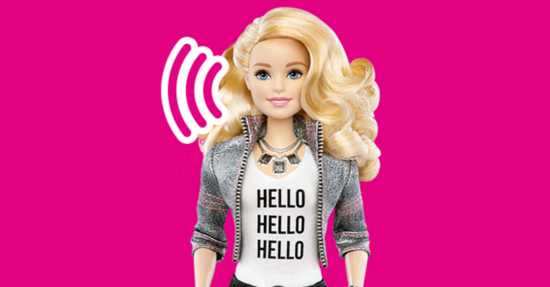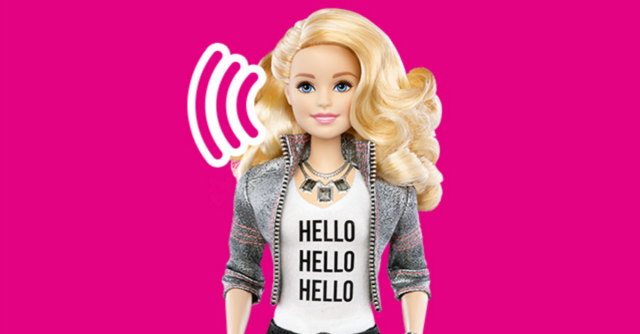
When I was a youngster in the ’80s, a talking toy bear called Teddy Ruxpin was all the rage.
Teddy was no Ted, the foul-mouthed stuffed bear who comes to life in the raunchy 2012 film (and its sequel): Teddy Ruxpin couldn’t interact with you; he was more of a furry cassette tape player with animatronic eyes and a mouth that sang songs and read stories.
Thirty years later (has it really been that long?) and talking toys have taken the next logical step. Mattel is releasing a talking version of Barbie this Christmas that can engage in two-way “conversation.”
Hello Barbie is equipped with a microphone and Wi-Fi connection that’s engaged when you hold down a button on the doll’s belt (it does not “passively record” conversations – i.e., the microphone isn’t always on).
When a child talks to Hello Barbie, the conversation is recorded and sent (encrypted) to a server where it’s interpreted by speech-recognition software, and the doll “talks back” to the child with pre-programmed responses.
If that sounds creepy to you, you’re not alone.
A US-based advocacy group called Campaign for a Commercial-Free Childhood (CCFC) set its sites on Mattel with a petition campaign launched in March 2015 to stop Mattel’s “eavesdropping doll.”
Now CCFC is stepping up the fight with a social media campaign it plans to launch under the banner of “Hell No Barbie,” the CBC reports.
As we’ve previously reported, Hello Barbie raises privacy concerns because recordings of children’s conversations are stored by the company – ToyTalk – that makes the voice recognition technology powering Hello Barbie.
CCFC’s executive director Josh Golin tells the CBC that Hello Barbie is a “perfect storm of a bad toy,” and says children’s conversations could be mined for information to market to kids:
Clearly this is going to be a trove of valuable information when you have a child talking perhaps for hours with a doll ... Mattel may be cutting deals for what products the doll is talking about.
But Mattel and ToyTalk have pretty explicitly said in their privacy policies that they will not use the conversations to advertise to children.
Mattel has also built in several parental controls: parental consent is required to set up a Hello Barbie account, and parents can listen to their child’s recorded conversations and delete all recorded conversations at any time.
ToyTalk says it only uses the recordings to improve its speech recognition technology, and personal information provided by the child is deleted according to the company’s Children’s Privacy Policy.
Tom Sarris, ToyTalk’s head of communications, told the CBC that ToyTalk has also integrated “a variety of privacy and security measures into Hello Barbie’s hardware and software.”
In reality, it’s the parents who are giving up the kind of data that can be used by Mattel to target them with marketing, which they consent to when they use Mattel’s websites and apps:
Occasionally, we might also send email or postal mail about upcoming Mattel products, Site updates, or promotions. We may also share information with other Mattel brands and Mattel family companies so that they can let you and your family know about products that might be of interest. Information that we or our agents or service providers collect using technology is used to help us understand our visitors, improve our products and services, manage our content and advertising, fulfill requests, measure the effectiveness or our advertising, maintain Site security, and protect intellectual property.
CCFC says that it’s concerned that when children play with Hello Barbie, it’s the doll, not the child that controls the play.
Kids’ development requires interaction with real people, not computer algorithms, CCFC says.
I would agree, and there’s a simple solution for parents who feel the same way: have your own personal boycott of the product – don’t buy it.
Image of Hello Barbie courtesy of Mattel.

